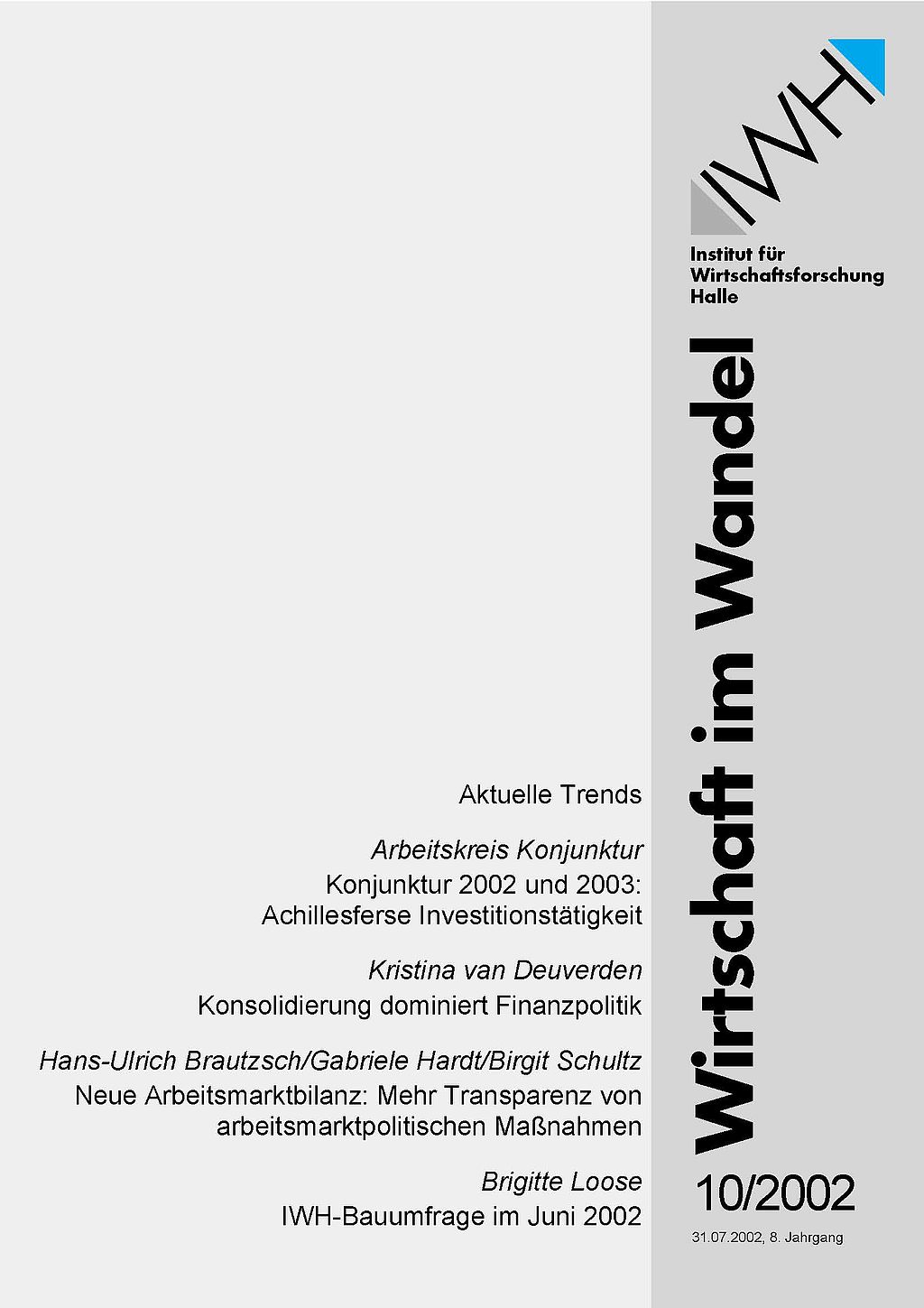
IWH Construction Industry Survey June 2002: East German construction industry in June 2002: Situation and forecasts slightly improved on low level


in: Wirtschaft im Wandel, No. 10, 2002
The article describes the increasing gap between persons engaged according to national concept and persons engaged according to domestic concept in East Germany and its impact on the labor market.

in: Wirtschaft im Wandel, No. 10, 2002
The Article analyses and forecasts the economic developments for the World and German in 2002 and 2003. During the winter 2001/2002 the World Economy was able to pull out of its trough. Nonetheless, the upswing did not reach investments and was mainly driven by consumption and exports in the USA and the remaining major economies, respectively. In the course of this and next year Investors will gradually regain their trust in the economy. The same will be the case for consumers in Germany and Europe. As a result a modest recovery on a wide front will develop. In the course of next year this recovery will start to weaken. In Germany, Wage Policy has retracted from its former moderate stance. Hence, although due to the improving economic conditions and the resulting slowed employment cuts by the end of 2002 as well as employment increases in 2003, the upswing on the labour market will not reach the dynamics of the 1999/2000 recovery. Fiscal Policy, caused by the need to consolidate the public budget, will be restrictive. Despite the low inflation risks, by the end of this year the ECB will have raised its major interest rate by 1/2 percentage point. Nonetheless, as interest rates in real terms will remain at relatively low levels a restrictive impact from the Monetary Policy in Germany and the Euro Area will is not expected. The most important Data for the World Economy and Germany are being stated in detailed tables.

in: Wirtschaft im Wandel, No. 10, 2002
Submitting the Stability and Growth Pact European member states committed themselves to reduce their budget deficits. In spring this year the German fiscal position worsened more and more and it became obvious that the deficit target would – again – be missed. Despite the worsened starting point Germany affirmed to follow its original stability programme and to attain a budget “close to balance” by the year 2004. Thus, consolidation will have to be strengthened and the scope for fiscal policy narrows down. If current fiscal policy is not sustainable, the necessity of consolidation is obvious. However, the mode of consolidation is controversial. The Stability and Growth Pact focuses on converging budget deficits close to balance. For this, short-term oriented consolidation dominates the more medium and long-term oriented aspects of fiscal policy. Generating economic conditions by fiscal policy is at least restricted, maybe temporarily impossible – and shortening the consolidation period increases its costs. A forecast of the government’s financial development in the years 2002 to 2006 shows clearly that the restructuring of revenues and expenditure will show no progress. In particular, the lack of structural reforms will burden Germany’s fiscal situation in the medium-term oriented consolidation period. However: the political self-commitment this spring leaves no scope for alternatives, but to enforce the consolidation. Despite some efforts, the projection concludes that by the year 2004 the budget will show a deficit.

in: Wirtschaft im Wandel, No. 10, 2002
The article describes the modified labour-market statement as produced by The Halle Institute for Economic Research (IWH) on the example of East Germany. There are included different new measures of labour-market policy which allow to reflect the extent of underemployment (including job creation measures) more completely and transparentely as before.

If you have any further questions please contact me.
+49 345 7753-720 Request per E-Mail
If you have any further questions please contact me.
+49 345 7753-720 Request per E-Mail